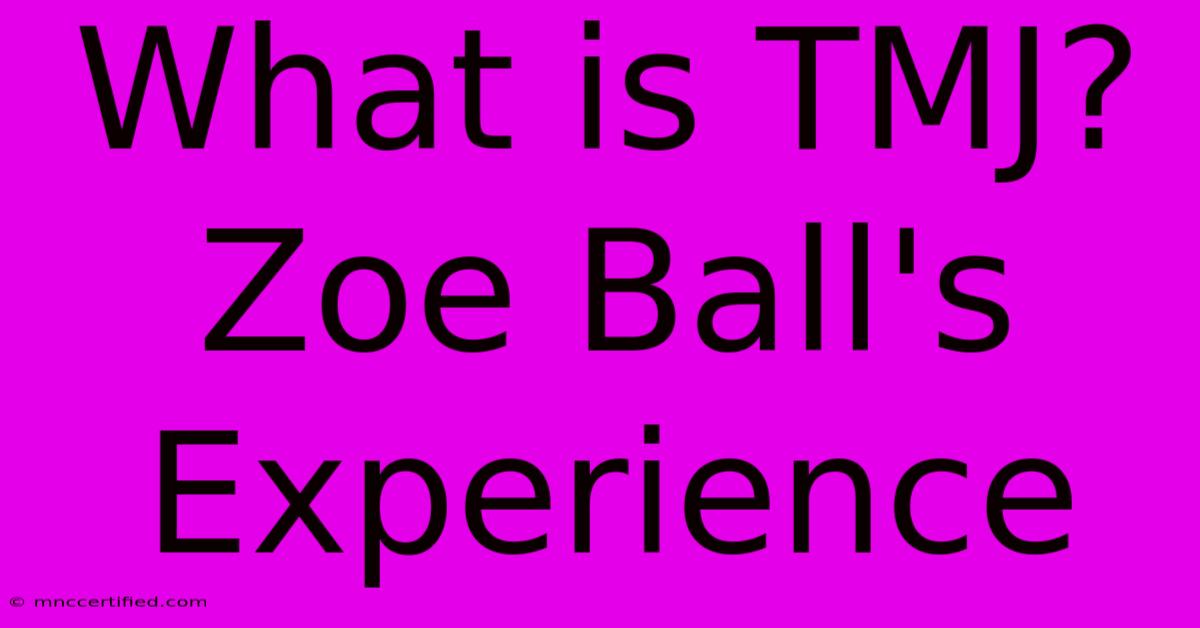What Is TMJ? Zoe Ball's Experience

Table of Contents
What is TMJ? Zoe Ball's Experience Sheds Light on This Often-Overlooked Condition
Temporomandibular joint (TMJ) disorder, often referred to as TMJ, is a prevalent condition affecting the jaw joint and surrounding muscles. Characterized by pain and dysfunction, TMJ can significantly impact daily life. While many experience mild symptoms, others, like broadcaster Zoe Ball, face more debilitating challenges. Understanding TMJ, its causes, symptoms, and treatment options is crucial for effective management. This article explores what TMJ is, delves into Zoe Ball's experience, and offers insights into seeking help.
Understanding the Temporomandibular Joint (TMJ)
The temporomandibular joint is the hinge connecting your lower jaw (mandible) to your skull. It's a complex joint, crucial for essential functions like chewing, speaking, and yawning. The intricate interplay of bones, muscles, ligaments, and cartilage allows for a wide range of motion. However, when this delicate balance is disrupted, TMJ disorder can develop.
Causes of TMJ Disorder
Pinpointing the exact cause of TMJ is often challenging, as it's frequently multifactorial. Potential contributors include:
- Injury: A blow to the jaw, whiplash, or even teeth grinding can damage the joint.
- Arthritis: Osteoarthritis and rheumatoid arthritis can inflame and damage the TMJ.
- Genetics: A family history of TMJ increases the risk.
- Stress: Increased stress often leads to teeth clenching and bruxism (teeth grinding), straining the jaw muscles.
- Jaw misalignment: Improper jaw positioning can put undue stress on the joint.
- Autoimmune diseases: Conditions such as lupus and fibromyalgia are associated with TMJ.
Zoe Ball's Public Battle with TMJ
Broadcaster Zoe Ball has openly discussed her struggles with TMJ, providing valuable visibility to this often-hidden condition. Her experience highlights the significant impact TMJ can have on daily life, affecting not only physical health but also mental well-being. While specific details about her diagnosis and treatment remain largely private, her public acknowledgement underscores the importance of seeking professional help. Her story serves as a powerful reminder that TMJ is a real and potentially serious condition, affecting people from all walks of life.
Recognizing the Symptoms of TMJ
TMJ symptoms vary widely in severity and presentation. Some individuals experience mild discomfort, while others face chronic, debilitating pain. Common symptoms include:
- Jaw pain: Pain in the jaw, often radiating to the face, temples, or neck.
- Headaches: Frequent headaches, particularly tension headaches or migraines.
- Earaches: Pain in the ear, sometimes mistaken for an ear infection.
- Facial pain: Pain in the cheeks, temples, or around the jaw.
- Limited jaw movement: Difficulty opening or closing the mouth fully.
- Clicking or popping sounds: Noises emanating from the jaw joint during movement.
- Muscle spasms: Tightness or spasms in the jaw muscles.
- Dizziness: In some cases, TMJ can even contribute to dizziness.
Seeking Help and Treatment Options for TMJ
If you suspect you might have TMJ, it's crucial to seek professional help. A diagnosis typically involves a physical examination, medical history review, and potentially imaging tests (X-rays, MRI). Treatment options vary depending on the severity of symptoms and the underlying cause. These may include:
- Pain relievers: Over-the-counter pain medications like ibuprofen or acetaminophen can help manage pain and inflammation.
- Muscle relaxants: These medications can help relax tense jaw muscles.
- Physical therapy: Exercises and stretches can improve jaw mobility and reduce muscle tension.
- Splints or mouthguards: These devices can help prevent teeth grinding and protect the jaw joint.
- Injections: Corticosteroid injections can reduce inflammation in the joint.
- Surgery: In severe cases, surgery may be considered as a last resort.
The Importance of Early Diagnosis and Management
Early diagnosis and management of TMJ are critical in preventing long-term complications. Ignoring the symptoms can lead to chronic pain, jaw dysfunction, and significant impact on quality of life. By understanding the condition, recognizing the symptoms, and seeking timely medical attention, individuals can effectively manage TMJ and maintain their overall well-being. Zoe Ball's experience serves as a powerful example of the importance of open communication and proactive healthcare in managing this often-underestimated condition.
Keywords: TMJ, temporomandibular joint disorder, jaw pain, headache, Zoe Ball, TMJ symptoms, TMJ treatment, jaw clicking, facial pain, earache, teeth grinding, bruxism, stress, arthritis, jaw misalignment, diagnosis, management.

Thank you for visiting our website wich cover about What Is TMJ? Zoe Ball's Experience. We hope the information provided has been useful to you. Feel free to contact us if you have any questions or need further assistance. See you next time and dont miss to bookmark.
Featured Posts
-
Manchester United Bodo Glimt Result
Nov 29, 2024
-
Tory Leadership Dame Rejects Badenoch
Nov 29, 2024
-
Nabers Teammate Loss Giants Vs Cowboys
Nov 29, 2024
-
Reliance Travel Insurance Usa
Nov 29, 2024
-
Cheapest Sport Cars To Insure
Nov 29, 2024